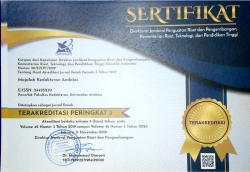The Role of Microbiota and Early Detection in Colorectal Cancer Through Fecal Screening
Muhammad Iqbal✉
Abstract
Objective: This literature review explores the link between gut microbiota and colorectal cancer, emphasizing early detection through fecal screening. Method: We conducted a comprehensive literature review, using Google Scholar and PubMed, with key search terms including "Microbiota," "Colorectal cancer," and "Fecal screening." Results: The gut microbiota plays a vital role in colorectal cancer development, involving specific bacterial strains such as Fusobacterium nucleatum, Escherichia coli, Bacteroides fragilis, Streptococcus bovis, Enterococcus faecalis, and Peptostreptococcus anaerobius. These strains contribute to cancer through various mechanisms. Fecal microbiota screening, often employing advanced techniques like next-generation sequencing, shows promise for early detection. Combining fecal microbiota data with other non-invasive screening methods can enhance colorectal cancer detection sensitivity and efficiency. Understanding this microbiota-cancer relationship is pivotal for cancer prevention and early diagnosis. Conclusion: The intricate microbiota- colorectal cancer connection, driven by specific bacterial strains and inflammation, presents opportunities for early detection. Fecal microbiota screening, combined with non-invasive methods, may reduce colorectal cancer mortality, advancing oncology prevention and diagnosis.
Keywords
Microbiota; Colorectal Cancer; Fecal Screening; Early Detection





















